AFOLABI
Emefiele: N’Assembly Moves To Stop Cardoso, Other Top CBN Officials From Participating In Politics
The National Assembly is seeking amendments to the Central Bank of Nigeria (CBN) Act 2007 to stop top officials of the apex bank from participating in partisan politics.
The amendment is aimed at prohibiting the chairman, governor, and deputy governors of the CBN from engaging in political activities or becoming members of any political party for three years after service.
Recall that former governor of the apex bank, Godwin Emefiele, was drafted into the political arena in the run-up to the 2023 presidential election.
The development generated tension in the polity, following the introduction of the infamous naira redesign at the twilight of the former President Muhammadu Buhari administration.
In a bid to stop such situation from repeating itself, the Senate now seeks to ban officials of the apex bank from further incursion into the political arena.
A part (amended section 8) of Central Bank of Nigeria Act 2007 (Amendment) Bill 2023 read, “The Governor and Deputy-Governors shall be persons of recognised financial experience and shall be appointed by the President, subject to confirmation by the Senate on such terms and conditions as may be set out in their respective letters of appointment.
“The Chairman shall also be appointed by the President. The Chairman, Governor and Deputy Governors shall not engage in or be a member of any political party until three (3) years after disengaging from office.”
The bill also proposed that the CBN’s top executives made up of the chairman, governor, and deputy governors, shall initially be appointed for a five-year term.
However, they may be reappointed for one additional term not exceeding five years.
A transitional clause stipulates varying terms for the initial deputy governors to facilitate a staggered leadership transition, with two appointed for three years and two for four years.
Keyamo asks Air France-KLM to introduce low-cost tickets for Nigerians
Festus Keyamo, minister of aviation and aerospace development, has urged Air France-KLM, a French airline, to make its low-cost tickets available to Nigerians.
Keyamo spoke when Air France-KLM delegates, Christine Quantin, the airline’s country manager; Antonia Umunna, the airline’s key account manager, commercial division; and Damilola Ogunseye, deputy station manager of the holding company, visited him.
In a statement on Monday by Tunde Moshood, special assistant on media and communications to Keyamo, the minister stressed the importance of fair pricing for Nigerian travellers.
Keyamo told the airline to consider offering low airfares to ensure parity with the cost of tickets in neighbouring countries.
Also, the minister said Nigeria is committed to enhancing partnerships within the travel industry.
He emphasised the government’s open-door policy and readiness to partner with airlines to enhance travel accessibility and affordability for all Nigerians.
“The courtesy visit by Air France-KLM exemplifies the mutual commitment to advancing the aviation sector in Nigeria and lays the groundwork for future collaborations aimed at delivering unparalleled travel experiences to passengers across the nation,” Keyamo said.
According to the statement, the delegates expressed excitement over the settlement of the airlines’ trapped fund, saying it showcases the effectiveness of collaboration in overcoming challenges within the aviation sector.
“During the meeting, Air France-KLM expressed appreciation for the improved facilities at the Murtala Muhammed International Airport, particularly acknowledging the enhanced experience at wing E,” the ministry said.
“They also extended gratitude for the Minister’s leadership in fostering a smoother relationship between their team and various aviation regulatory agencies.
“Highlighting their commitment to innovation and service excellence, Air France-KLM announced the launch of their new Airbus A330/A350 aircraft, emphasising their dedication to deploying modern and improved aircraft services on routes within Nigeria.”
The delegates said the launch of the aircraft is in line with the company’s overarching goal of providing Nigerian travellers with a superior journey experience.
Rivers Crisis: Governor Fubara Vows To Probe Wike’s administration, Sets Up Judicial Panel
The Rivers State government, under the leadership of Governor Siminalayi Fubara, is set to probe the affairs of his predecessor in office, Nyesom Wike.
Naija News reports the current Rivers State government is preparing to establish an investigative committee to scrutinize the operations of the previous administration under Nyesom Wike for the eight years he was in power.
Fubara spoke on Monday, May 13, after inaugurating Dagogo Iboroma (SAN), as the new Attorney-General of the state.
Earlier on Monday, the factional House of Assembly led by Victor Oko-Jumbo had screened and confirmed Iboroma for appointment.
This development marks a new turn in the political crisis that has engulfed the oil-rich state and pitted Fubara and Wike against each other.
It would be recalled that Fubara was the Accountant General of Rivers State during the administration of Wike in Rivers State.
Speaking at the Rivers State government house, Fubara stressed the need to probe governance in the state, adding that there is no going back on the decision.
He said: “As it is today, in the local parlance they say the jungle has matured. We will be setting a panel of enquiry to investigate the affairs of governance.
“So brace up, I’m not going back on it.”
The announcement by the Governor attracted applause from those present at the event.
Ajaka vs Ododo: Tribunal reserves judgment in Kogi governorship election dispute
The Kogi state governorship election petition tribunal sitting in Abuja has reserved judgment in the suit challenging the election of Usman Ododo as governor of the state.
The Independent National Electoral Commission (INEC) announced Ododo, the candidate of the All Progressives Congress (APC), as the winner of the Kogi governorship election held on November 11, 2023.
Ododo polled 446,237 votes to defeat Murtala Ajaka, candidate of the Social Democratic Party (SDP), who came second with 259,052 votes, and Dino Melaye of the Peoples Democratic Party (PDP), who scored 46,362 votes.
The SDP and Ajaka, after the poll, filed petitions to challenge the victory of Ododo.
At the court session on Monday, lawyers to parties in the petition made their final submissions and adopted their written addresses.
The INEC, APC, and Ododo urged the three-member panel tribunal, led by Ado Birnin-Kudu, to dismiss the petition for lacking merit.
Kanu Agabi, a senior advocate of Nigeria (SAN) and lawyer to INEC, argued that the petition lacked merit and was incompetent.
He urged the tribunal to either strike it out or dismiss it.
“It is our humble submission that your work in the determination of this petition is simplified in recent judgments by the court of appeal and supreme court.”
He argued that the appeal court had decided that a petition should be struck out if the grounds on which it is established are inconsistent with one another, and are not consistent with the reliefs.
The INEC counsel also argued that the evidence of the petitioners was grossly insufficient, citing a supreme court decision in a case by Tonye Cole against INEC.
“In that case, the petitioner filed 305 witness depositions but only adopted 40 of them. The petitioner only adopted about 13.1 percent of the witness depositions,” he said.
“In this case, (the petition by the SDP and Ajaka), the depositions adopted represent just about 3.6 percent of their witness depositions,” Agabi said.
He noted that the petitioners only called 25 witnesses, adding that in the mathematical calculation of evidence, 3.6 percent of Ajaka’s witness deposition adopted in the petition amounted to a failure and therefore ought to be dismissed.
Agabi argued that the petitioners’ witness, who testified about the bimodal voter accreditation system (BVAS) machines, stated that he could not guarantee whether those were the BVAS used.
He added that out of the 25 witnesses called by the petitioners, there was no single polling unit agent among them.
Similarly, Joseph Daudu, the lawyer to Ododo, faulted the competence of the petition which he said was statute-barred for having allegedly been filed out of time.
Daudu urged the tribunal to dismiss the allegation of forgery made by the petitioners against his client.
He argued that such an issue bordered on pre-election matters, which could not be raised in the state of post-election litigation.
Emmanuel Ukala, counsel to APC, also prayed the tribunal to dismiss the petition for lacking merit.
Petitioners’ lawyer, Pius Akubo, faulted the claim by the respondents that the petition was filed out of time.
He also submitted that the petitioners have provided sufficient evidence to support their case that the election was marred by irregularities and corrupt practices.
Akubo prayed to the tribunal to allow the petition and reverse Ododo’s victory.
After taking the arguments, Birnin-Kudu, the chairman of the tribunal, reserved judgment on the petition.
“The date will be communicated to both parties,” he said.
Naira depreciates further at parallel market
The naira depreciated to N1,520 per dollar at the parallel section of the foreign exchange (FX) market on Monday.
This signifies a 3.4 percent decline from the N1,470/$ traded on May 10.
The bureau de change (BDC) operators, popularly known as street traders, put the buying price of the dollar at N1,490 and the selling price at N1,520 — leaving a profit margin of N30.
At the official window, the local currency depreciated by 0.80 percent against the dollar to close at N1,478.11 on Monday — from the N1,466.31 traded on May 10.
According to FMDQ Securities Exchange, a platform that oversees official FX trading in Nigeria, an exchange rate of N1,490 to the dollar was the highest rate recorded during trading and the lowest rate was N1,322/$.
Meanwhile, Olayemi Cardoso, governor of the Central Bank of Nigeria (CBN), on Monday, said the apex bank had been “reoriented” to focus on price and monetary stability.
Cardoso said the official FX market has been stabilised.
According to the governor, investors previously had a “tendency to head for the window” in response to currency fluctuations, however, there has been a “fundamental shift”.
Cardoso said investors are getting more comfortable with the official window.
Naira Crash: EFCC Vows To Clampdown On Businesses, Others Charging In Dollars
The Economic and Financial Crimes Commission (EFCC) has intensified its efforts against illegal dollar transactions in Nigeria, warning businesses and individuals against illegal dealing in foreign currency.
Naija News reports that the Acting Director of Public Affairs for the EFCC, Wilson Uwujaren, made this disclosure while speaking on Channels Television’s program, Politics Today.
He emphasized the agency’s commitment to enforcing the law strictly.
Uwujaren declared, “The ship has already left the train station. We have started a movement, and we are not going to relent.”
He urged the public to cooperate with the EFCC by reporting any suspicious activity.
“The advice I will have for Nigerians is that wherever you see this kind of development happening, the onus is on you to alert the EFCC. We can’t be everywhere but I can assure you that once we have the evidence that people are violating the law, the EFCC under the leadership of Ola Olukoyede will not spare anybody.”
This renewed crackdown on dollar transactions is part of a broader initiative to stabilize the Nigerian economy and ensure compliance with financial regulations.
“The movement has started and we would not rest,” Uwujaren added, signaling a robust approach to tackling economic crimes and maintaining the integrity of the nation’s financial system.
[OPINION] Cybersecurity Levy: Matters Arising - Reuben Abati
The report that President Bola Tinubu has now ordered the Central Bank of Nigeria (CBN) to suspend the implementation of the proposed Cybersecurity Levy must come to many Nigerians as some sort of relief, but before we deal with the sense or non-sense of the levy itself, where does this leave the autonomy of the CBN? The Presidency has tried to walk back the narrative by saying that the directive is to the Office of the National Security Adviser (ONSA), and not the CBN, but come off it, it is the CBN that has given a directive to the banks, ONSA is to manage the fund, and receive 40% of whatever is collected by the CBN. It is therefore not surprising that many civil society groups and experts have raised questions about the law, the process, and the policy. These include the Nigerian Labour Congress (NLC), the Trade Union Congress (TUC), NACCIMA, KPMG, Afenifere, Northern Elders Forum, Coalition of Northern Groups, Centre for the Promotion of Private Enterprise (CIPPE), BudgIT, SERAP and others. The CBN directive is based on Section 44 (2) of the Cybercrime Prevention and Prohibition Act of 2024, itself an amendment of the same law of 2015.
Femi Falana, SAN, in an informed opinion has raised the point that the CBN misinterpreted the law, and that the Act itself is contradictory. His specific reference is to the fact that the CBN wrongly directed all financial institutions to apply the levy at the point of electronic transfer origination, and to be so explicitly noted in customer accounts under the description Cybersecurity Levy and remitted to the CBN. Falana argues that the erroneous impression has been created that the levy is payable by individual customers using the services of commercial banks, payment system banks, non-interest banks, merchant banks, mobile money operators, and payment service providers. The phrase “businesses” in the 2015 Act has been substituted for “business” in the 2024 amendment, and there is confusion as to whether the levy is 0.005% or 0.5%. He argues further that the CBN owes Nigerians an apology for the misleading interpretation of the clear and unambiguous provisions of the Act to wit: Section 42(a) which makes it clear that the levy shall be applicable to GSM providers, Internet service providers, banks and other financial institutions, insurance companies and the Nigerian Stock Exchange.
Falana’s position was subsequently on all fours with the decision of the House of Representatives that the implementation of the levy should be suspended because, as Hon. Kingsley Chinda puts it, it contradicts the Second Schedule of the Act. Last Thursday, Hon. Chinda, representing Obio/Akpor Constituency moved a motion for the immediate halt and modification of the levy announced by the CBN on May 6. The House concurred, and so resolved. However, the Senate speaking through Senator Shehu Umar Buba, Chair of the Senate Committee on National Security and Intelligence, argued that the CBN circular is in line with the Act as amended and that there are exemptions duly stated in the law. These exemptions, 16 in all are listed in the appendix to the CBN circular, but what we see is apparent confusion even among the lawmakers, despite the fact that the best way to know the value of any law is through its implementation. This is one clear instance in which the implementation of a law has been subjected to a rigorous test and robust opinion by those it is meant to serve. The law has raised a number of interesting questions that should serve as necessary guide: Can public institutions be funded directly by bank deposits with the CBN as a collecting agent? Can the Office of the National Security Adviser receive unappropriated funding for its activities? Since banks already charge fees for electronic transfers, does the electronic transfer levy for cybercrime protection not amount to double taxation? Should ONSA be a revenue collecting agency? And how do we reconcile the obvious confusion in the law?
Olisa Agbakoba, SAN has since added his voice to the controversy by noting that the cybersecurity levy is unconstitutional. It runs counter to the letter and spirit of Section 162(1) and 162(3) of the 1999 Constitution which make it clear that all federally collected revenue must go into the Federation Account and “shall be distributed among the Federal and State governments and the Local government Councils in each state on such terms and in such manner as may be prescribed by the National Assembly”. A combined reading of both sections is instructive. It has been argued that some agencies such as the Federal Inland Revenue Service (FIRS), Nigeria Ports Authority (NPA), Nigerian Maritime and Safety Agency (NIMASA) and Customs retain a percentage of their revenue, but the point is clear that ONSA cannot transform itself into a revenue collection agency. Agbakoba has served notice that he will challenge the law in court. SERAP has already gone to court on the same matter in suit number FHC/LCS/822/2024 filed at the weekend to seek an order of interim injunction against the CBN.
In sum, the key arguments against the Cybersecurity Levy is that the timing is bad, it is not a good idea and that the 2024 Amendment is fuzzy, the proposed implementation is unconstitutional. Senator Buba who has been most vociferous in defending the law says “it is customary that a public hearing is held before every bill is passed, and the amendment of the Cybercrime Act 2024 was no exception, involving the participation of people from all spheres of human endeavour who witnessed the process.” Nigerians are asking where were we when this law was amended and passed? Perhaps there is a lesson here about the need for the Nigerian citizenry to be more vigilant and attentive where lawmaking is concerned. Buba adds that “Nigeria’s Cyber Threat profile extends far beyond cybercrime, with other major cyber threats classified under the National Cybersecurity strategy. To survive as a nation, the current weak approach to enforcing national cybersecurity directives must be re-examined and prioritized, among other considerations. The country must fund its cybersecurity and counter-terrorism programme independently, not through foreign aid.” I have not heard anyone disagreeing with the fact that Nigeria needs a strong cybersecurity framework.
Even the International Monetary Fund (IMF) referred to the importance of a cybersecurity framework during the presentations of its Article IV Consultation Report. Despite the people’s skepticism about IMF and its bitter pills, nobody has raised any objection against this observation. What the people are saying is that a cybersecurity levy is likely to harm businesses which already pay more than 40 taxes. It will drive people away from the banking system, since it would be wiser to keep money at home than go through formal payment systems and be over-taxed. By introducing the cybersecurity levy, government has inadvertently hobbled its financial inclusion and cashless transaction policy. KPMG has made the point that government cannot achieve economic growth through over-taxation. Dr. Ngozi Okonjo-Iweala, the Director General of the Word Trade Organization (WTO) has said Nigeria needs to streamline its taxes.
Nobody likes the tax man. But what bothers Nigerians is the fact that the Tinubu administration keeps sending mixed signals about its revenue drive. Both the CBN Governor, Yemi Cardoso, and the Minister of Finance, Wale Edun once famously said that the Tinubu administration is not out to tax people to raise revenue, even if it would broaden its revenue collection strategies. Chairman of the Presidential Fiscal Policy and Tax Reforms Committee, Taiwo Oyedele, at the closing out session of the body over the weekend, said 95% of the informal sector should be exempted from all taxes, especially businesses earning N25 million a year or less. His words: “We think that the informal sector are people who are trying to earn legitimate living, we should allow them to be, and support them to be…” The Tinubu administration has a good supply of persons who say the right things but do the very opposite. President Tinubu himself promised “renewed hope” but Nigerians have never been this nervous. For no fault of theirs, the people have been the target of a heavy burden of multiple taxation: the very day that President Tinubu assumed office on May 29, 2023, he removed fuel subsidy, the same subsidy removal that the Buhari administration cleverly avoided. Life has become harder for Nigerians since then, and the price of everything has gone up, and keeps going up, against the natural law of gravitation. Headline inflation is over 32%, threatening to go higher (experts are projecting that it could go as high as 34% when the National Bureau of Statistics announces April inflation figures tomorrow), food inflation is at an unprecedented level in known history. Electricity tariff at N206.80 for Band A customers has thrown many homes into darkness and agony, the DISCOs do not provide 20 hours of electricity as promised, and the people cannot pay because they are overburdened. Businesses are naturally transferring their own burdens to the people. Telecommunication operators have asked for the leave of the Nigeria Communications Commission (NCC) to increase call rates. Cable TV service providers have also hiked their rates. Organized Labour is fighting for a minimum wage but the minimum of N615, 000 that they are asking for sounds airy. Nigeria has become dystopian and what the people cannot understand is the manner in which government officials carry on as if they live in paradise.
It is important to fund cybersecurity, yes, but that money can come from plugging wastages in government. Ministers go about in a convoy of exotic vehicles, lawmakers in Abuja ride SUVs which they pass on as project vehicles but we all know that no lawmaker inspects any project. And by the way, what happened to the Nigerian government’s monetization policy? The salary of Ministers was adjusted upwards years back to address accommodation and transportation needs, but the government has refused to implement the policy. It is easier to impose hardship on the people, but the easiest option is not always the best.
What also irks the people is the lack of accountability, and the opaqueness at the heart of government processes. The cybersecurity levy would raise over N4 trillion annually, and 40% of that would be managed by the ONSA. Defence and security already take the bulk of government budget and expenditure every year, and yet insecurity remains Nigeria’s major problem. Even if Nigerians understand the importance of cybersecurity, they do not trust their government enough to pay additional tax. And why is the CBN involved in the collection of tax – what is primarily a fiscal policy function? Is the CBN a pawn in a revenue collection game? It has now been driven into a corner. Much worse is the fact that some banks did not even wait till the specified date of May 20 in the CBN circular; they have started taking people’s money, duly stating same as cybersecurity levy. Nigerian banks must resist the temptation to act as criminal enterprises. They don’t serve their customers well – always complaining that there is no money or that their network is down. When they manage to pay across the counter, they give out dirty, torn notes. Most of the ATMs in banks across the nation no longer dispense cash. Mobile payment operators have more cash than the banks, and are far more reliable, and Naira retailers at social events have new notes that are not available in the banks! All the banks that have collected cybersecurity levies from their customers, ahead of May 20, must refund all the deductions, with an apology. Banks should serve their customers and not steal from them! Thievery is incompatible with the task of financial intermediation.
President Tinubu has directed that the implementation of the Cybersecurity levy should be suspended. This is a welcome development. It makes the people happy. It shows that the government has listened to the yearnings of the people. This is a habit that the Tinubu administration should cultivate: to restore hope, the government must avoid anti-people policies. The CBN is yet to withdraw its circular on cybersecurity levy. It must do so forthwith, otherwise the banks would insist that they have not received any counter-directive from the regulator. The withdrawal must be well-publicized, and there must be an apology attached to it. But that is not the end of the matter. The National Assembly must take another look at the amended Act and re-amend it further. Members of that Assembly are in Abuja to defend the people’s interest and promote the common good. It is downright offensive to see the Senate and the House of Representatives arguing over a piece of legislation that they both worked on and passed. Their confusion is unhelpful. On the Cybersecurity Prevention and Prohibition Act of 2024 (as amended), they need to go back to the drawing table, and be properly guided by public responses. Besides, as Agbakoba SAN has rightly argued, the National Assembly cannot make a subsidiary legislation that bypasses the Constitution and puts federally collected revenue in the hands of an agency. This was the decision in AG Rivers State vs. AG Federation and others in 2022, where the court upheld the provisions of Section 162(3) of the 1999 Constitution with regard to the controversy over the Nigeria Police Trust Fund. And let everyone pay attention to their schedule: it doesn’t look tidy having the President overruling the Central Bank.
Labour unions picket NERC offices in Lagos, Abuja over electricity tariff hike
Members of organised labour are currently picketing offices of the Nigerian Electricity Regulatory Commission (NERC) nationwide.
The Nigeria Labour Congress (NLC), Trade Union Congress (TUC), and other affiliate groups, are protesting the increase in electricity tariff for customers under the Band A category.
On April 3, NERC approved an increase in electricity tariff for customers in the classification — from N66 to N225 per kwh.
Organised labour is calling for a reversal of the increase and a return to the negotiating table.
On Monday, the unionists arrived at the NERC office located at Novel House in Ikeja, Lagos, around 9:40am.
Addressing workers at the complex, Funmi Sessi, NLC Lagos chairperson, asked them to vacate their offices.
Sessi said the unions do not understand the regulatory functions of NERC amid the epileptic power supply in the country.
In Abuja, the unions besieged the NERC office located in the Central Business District.
Labour has also shut NERC offices in Jos, Akwa Ibom, Benin, Kaduna and in other capital cities across the country.
LAGOS
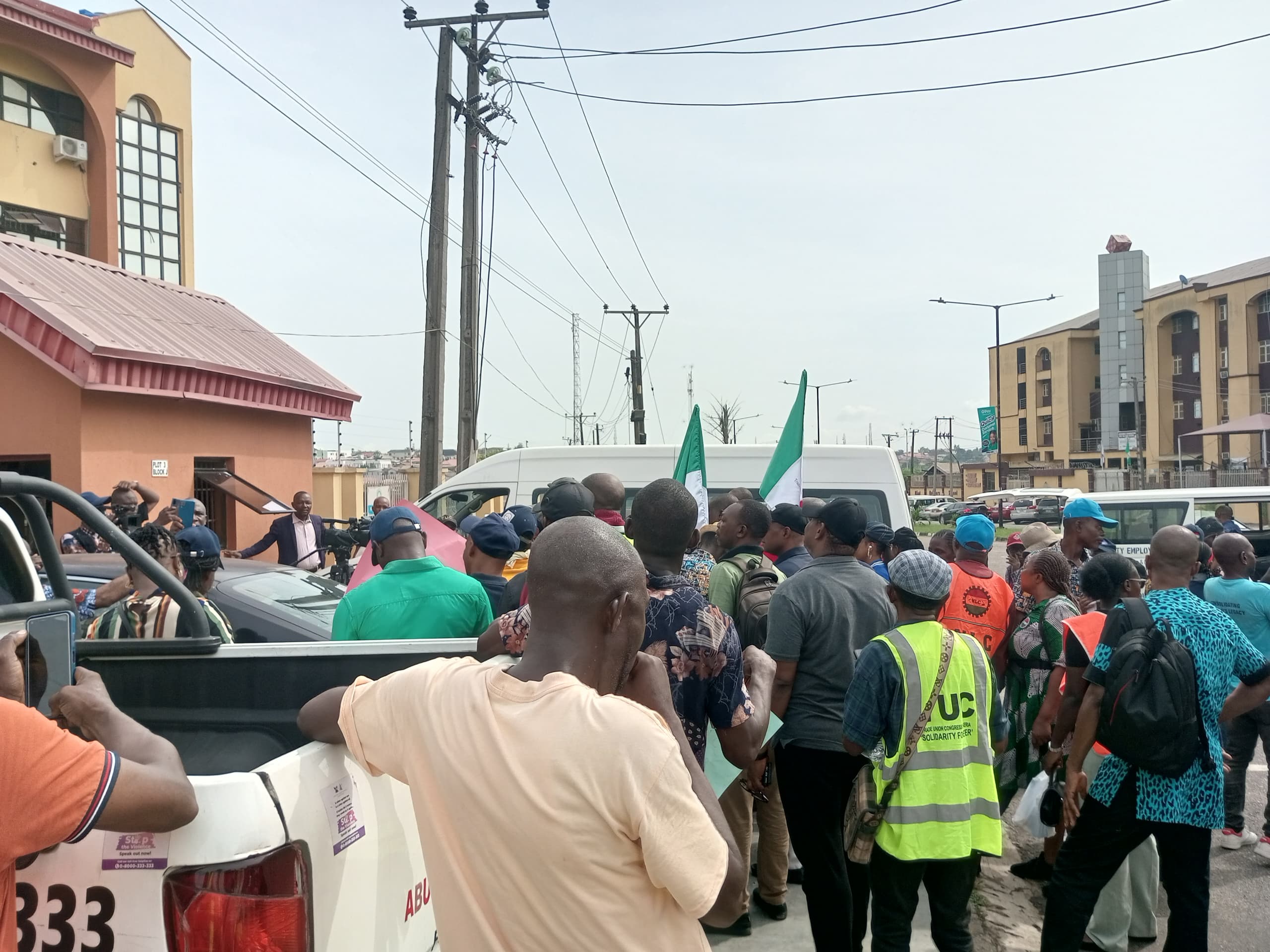
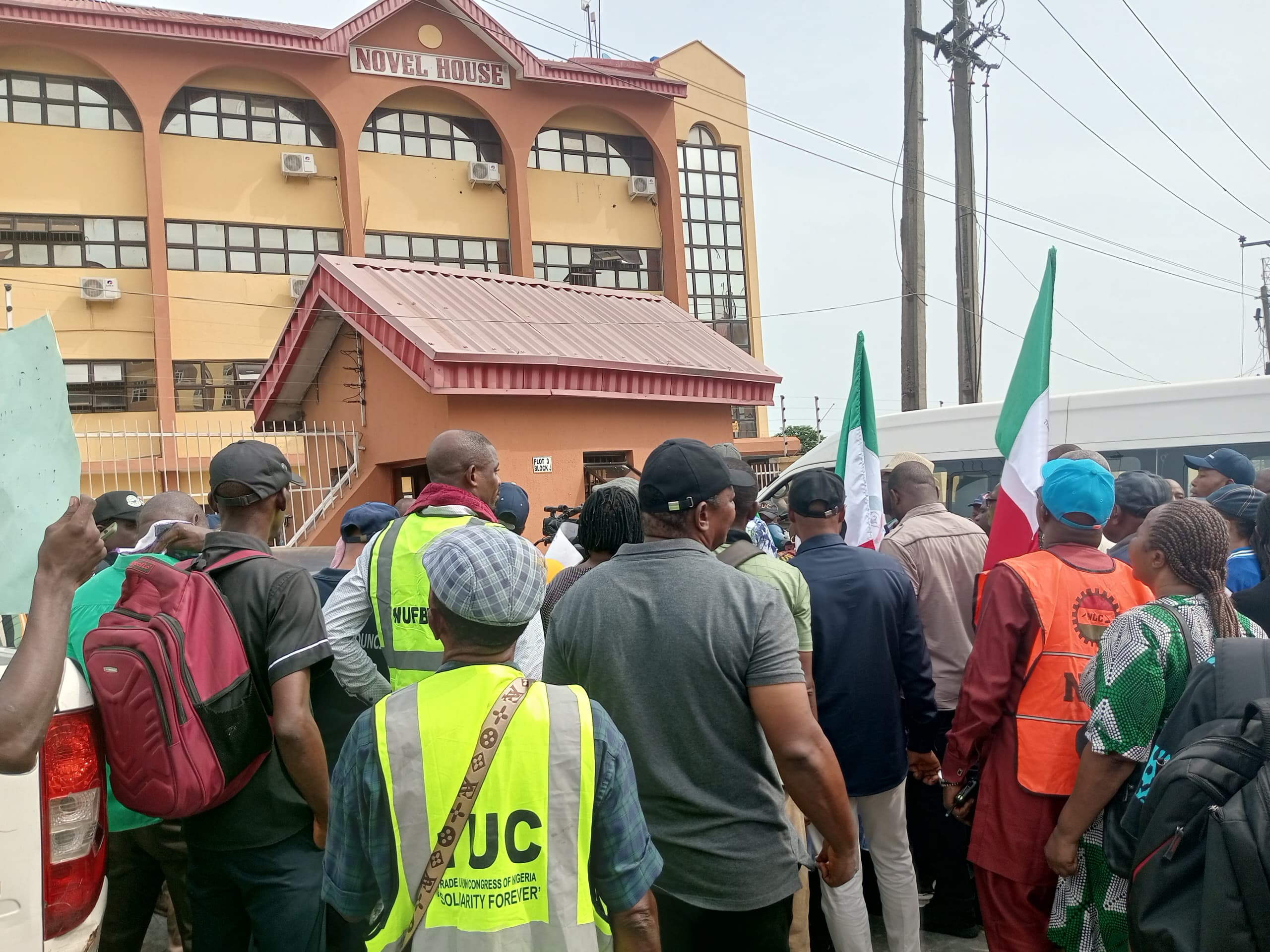
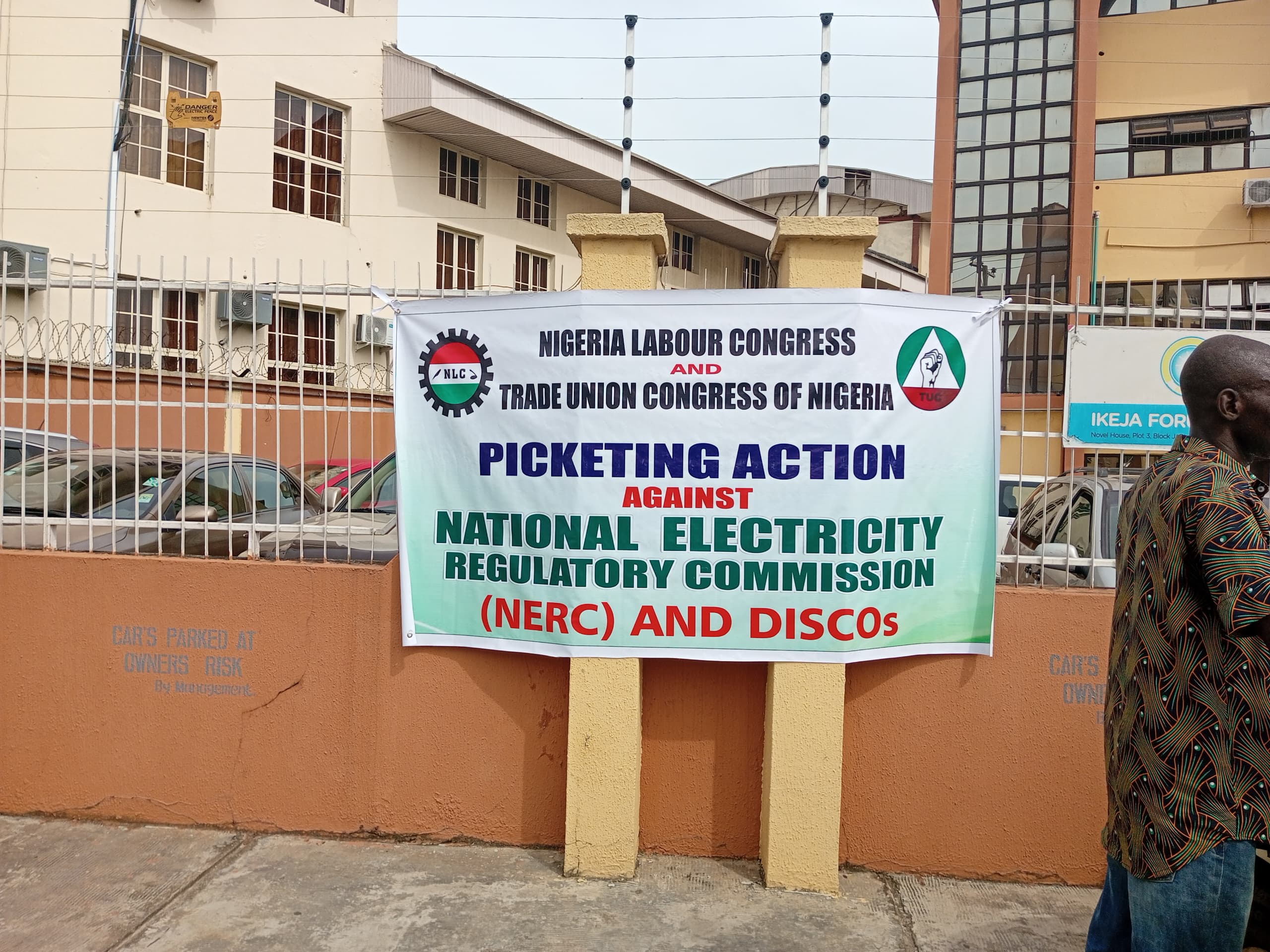
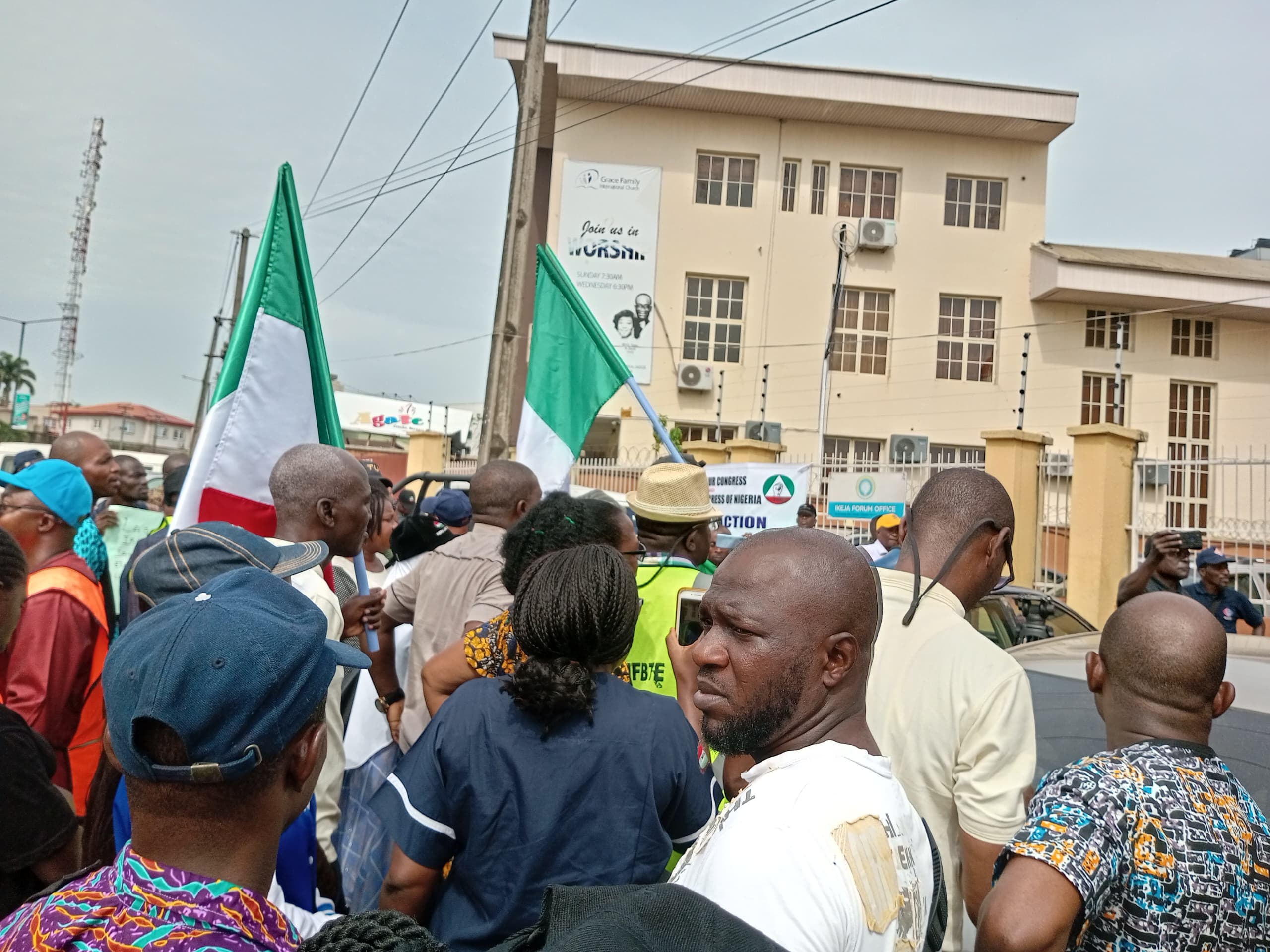
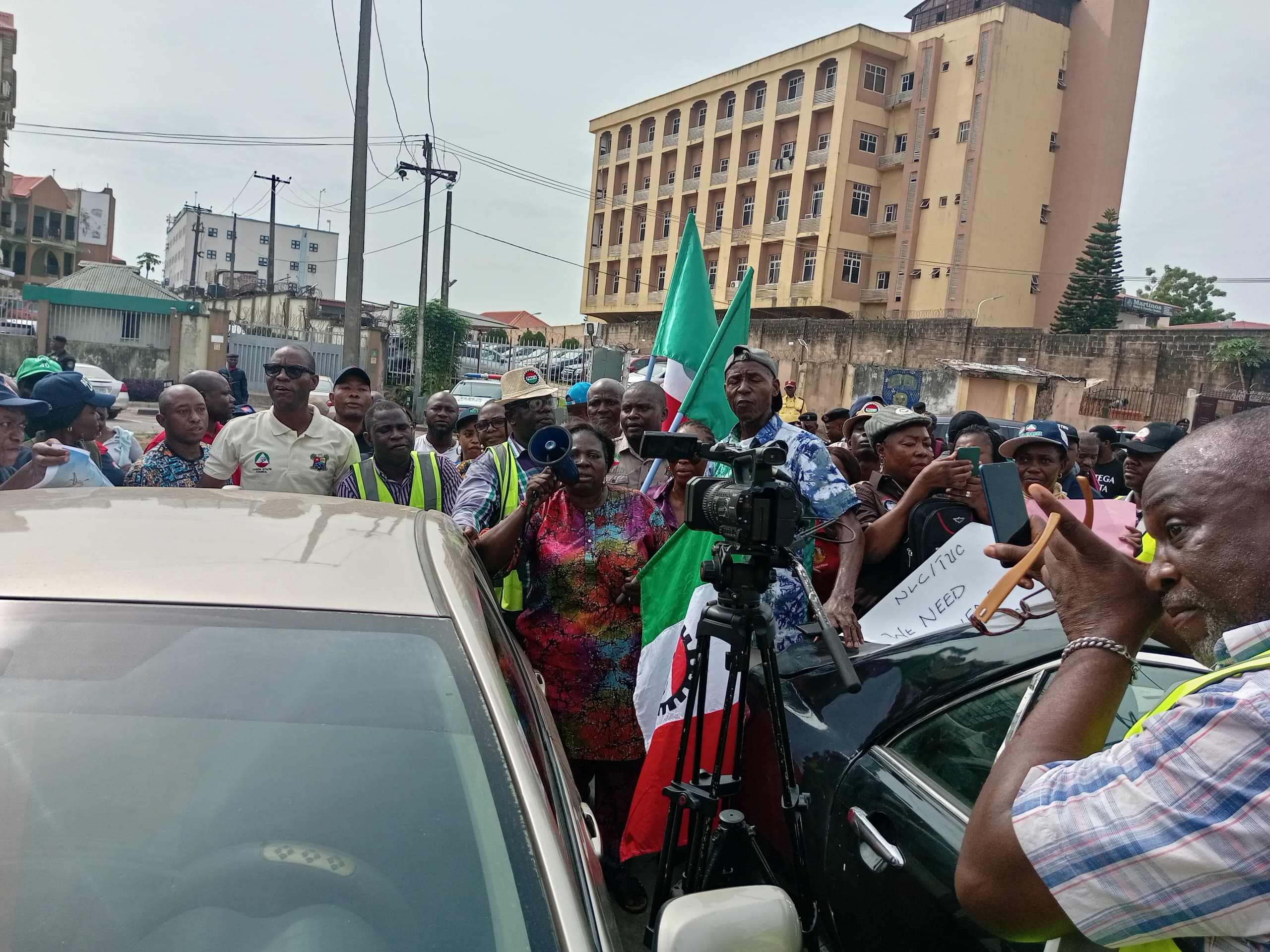
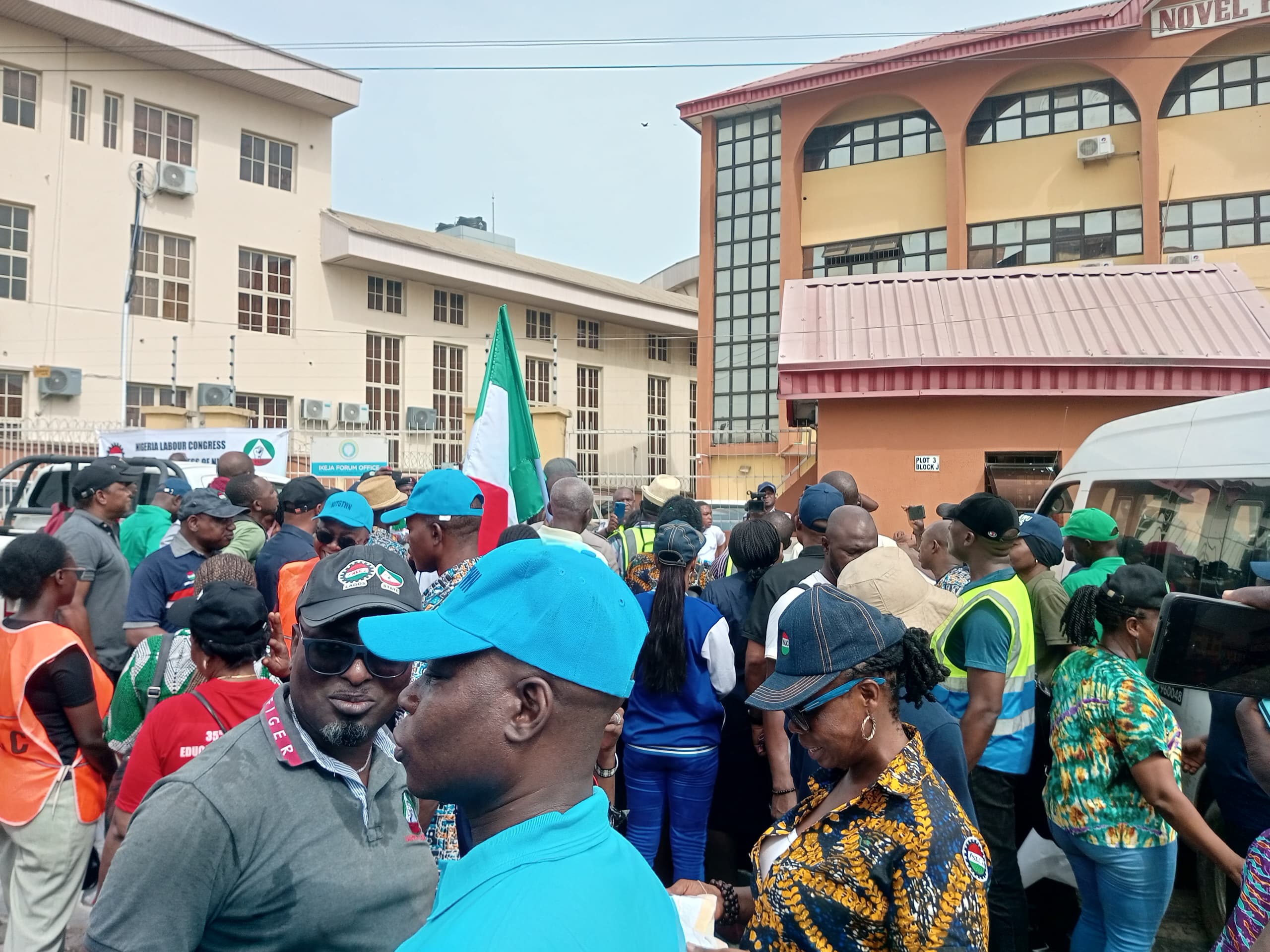
ABUJA
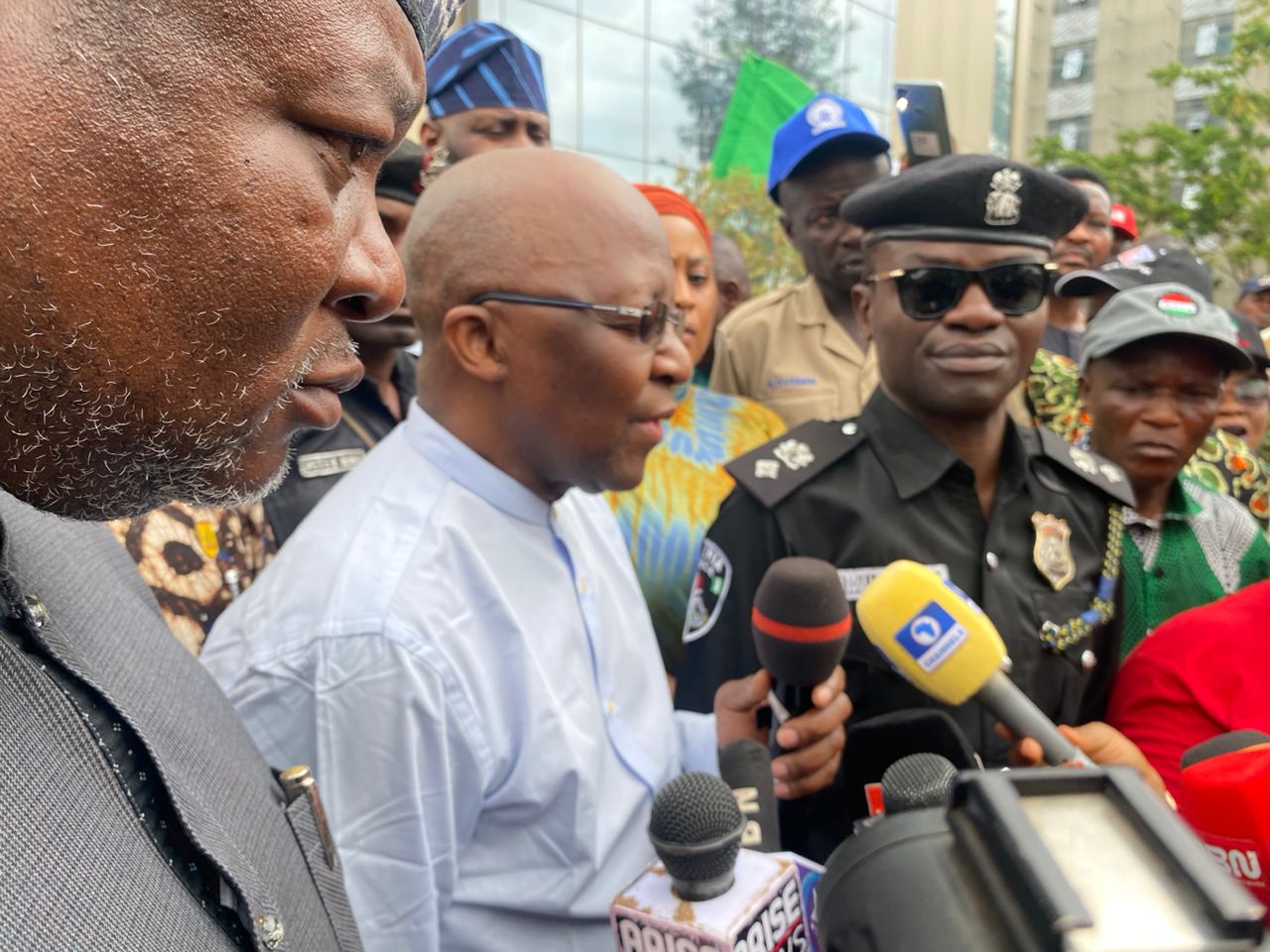
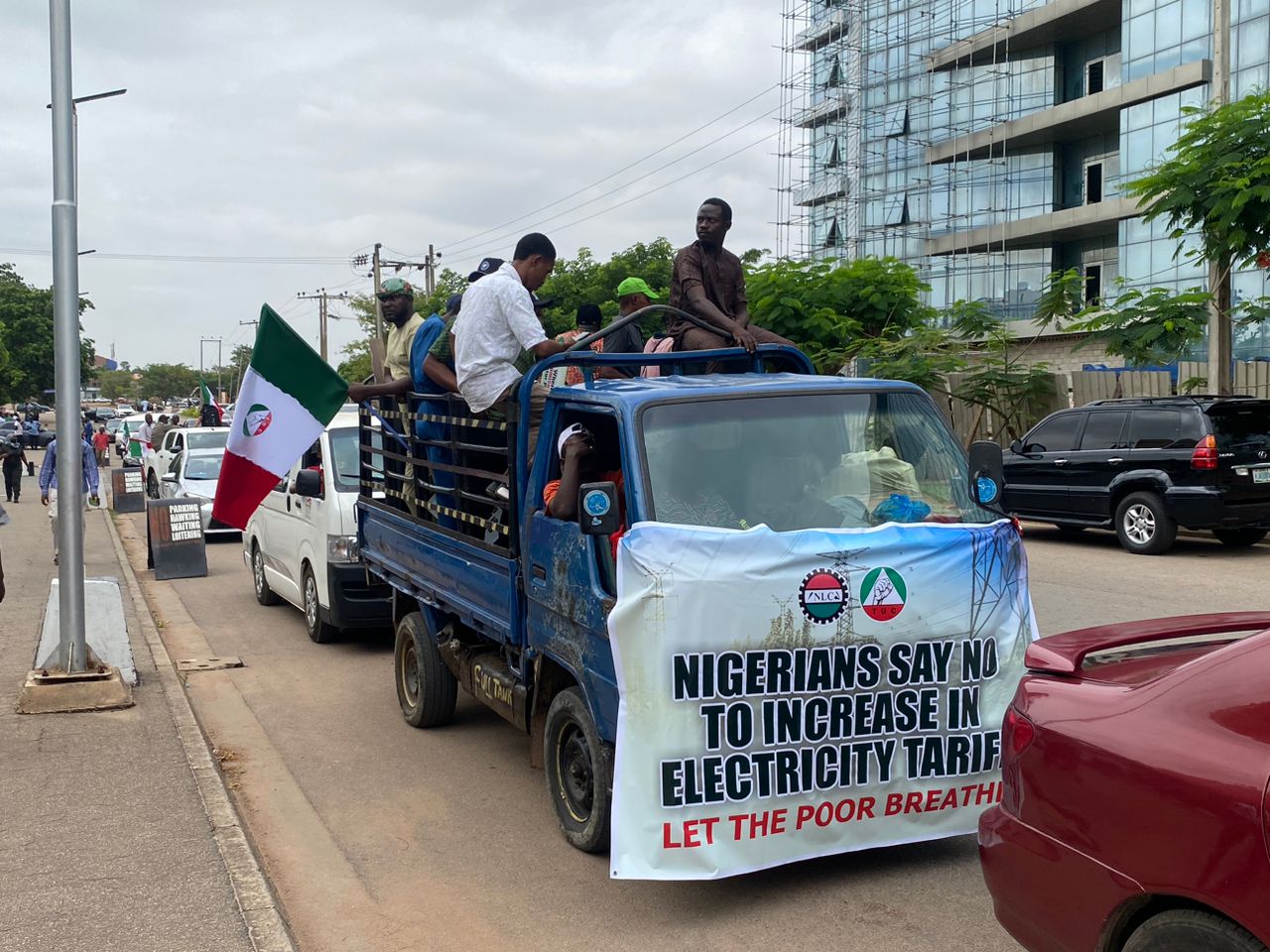
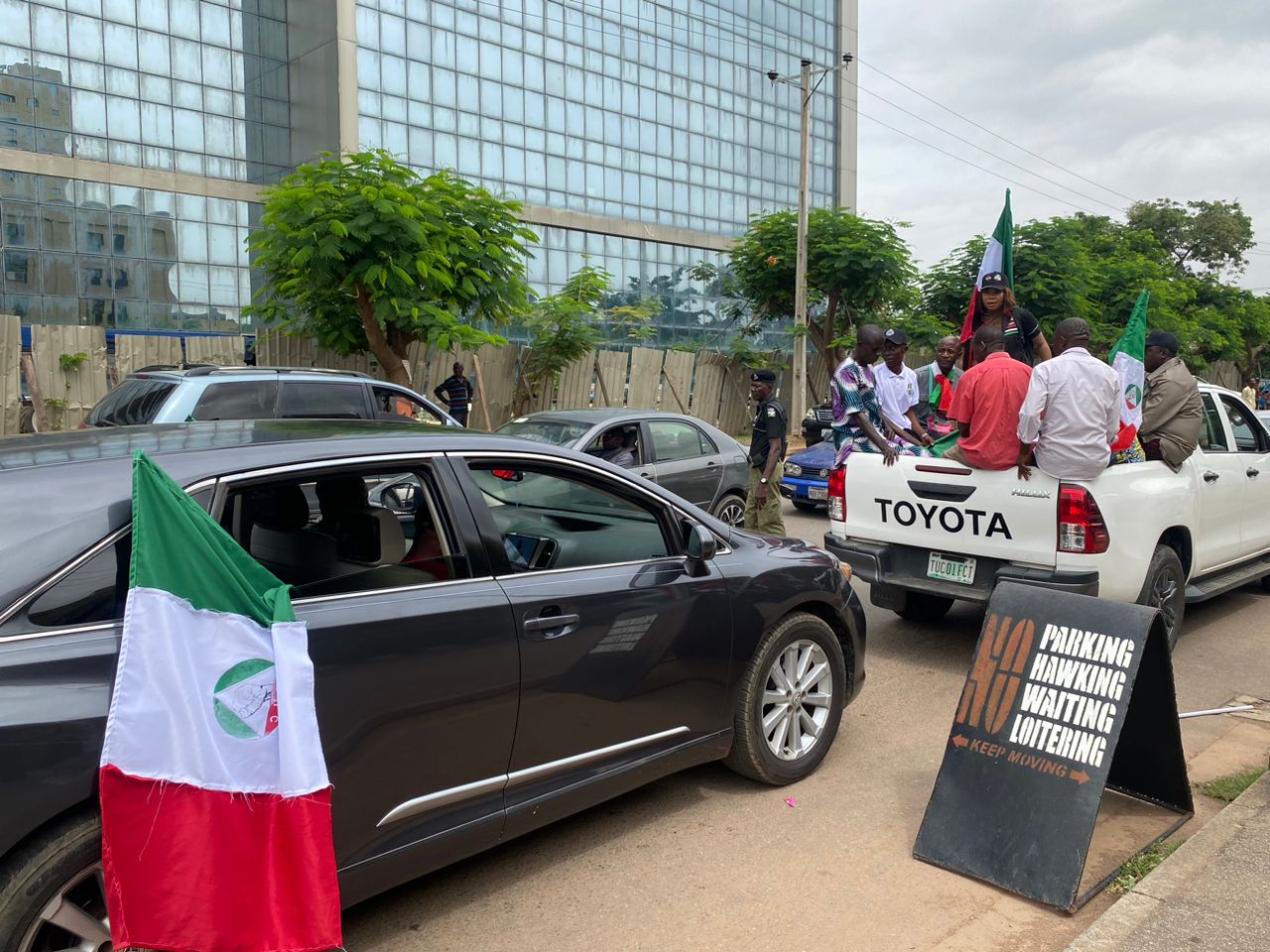
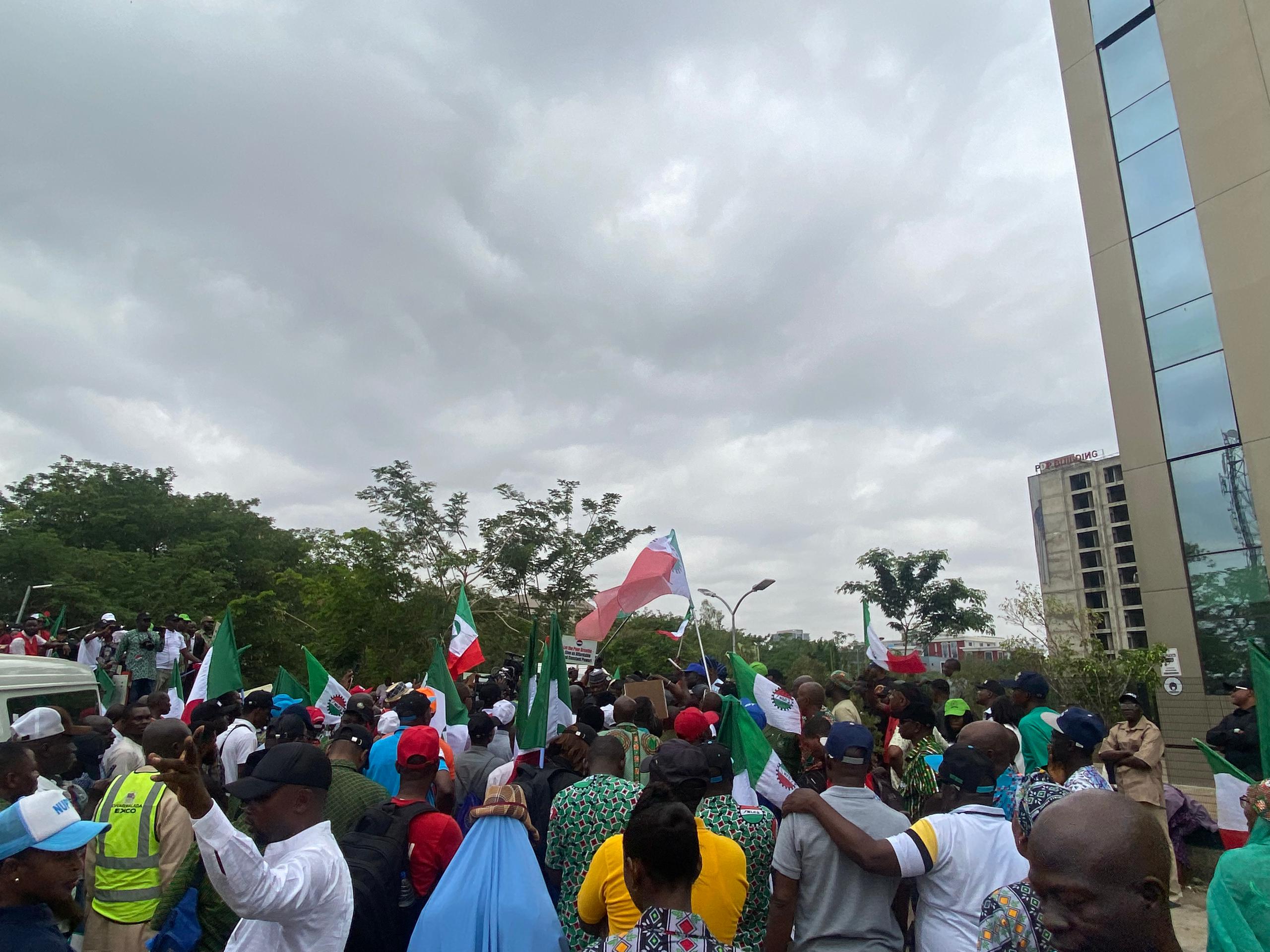
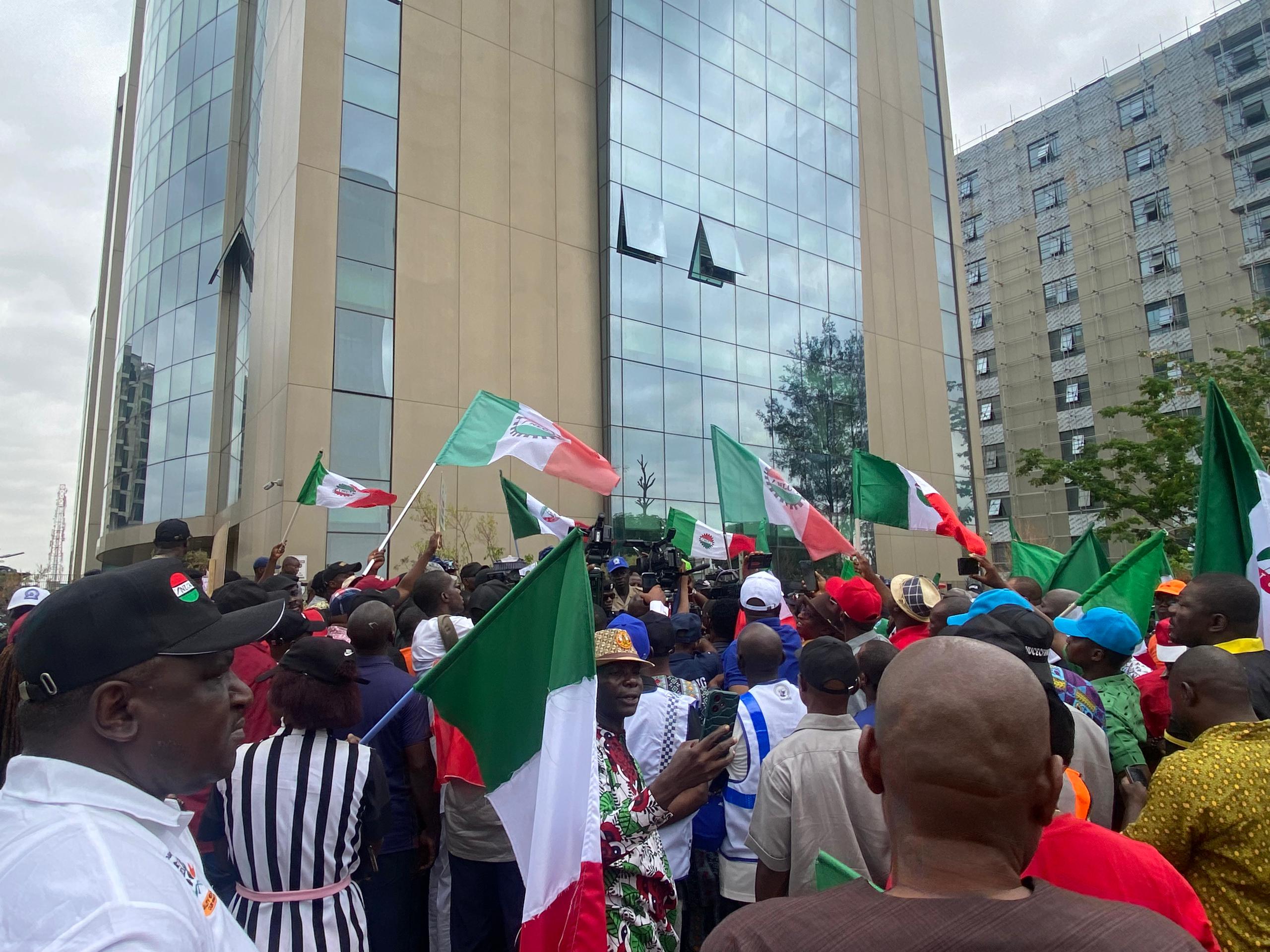
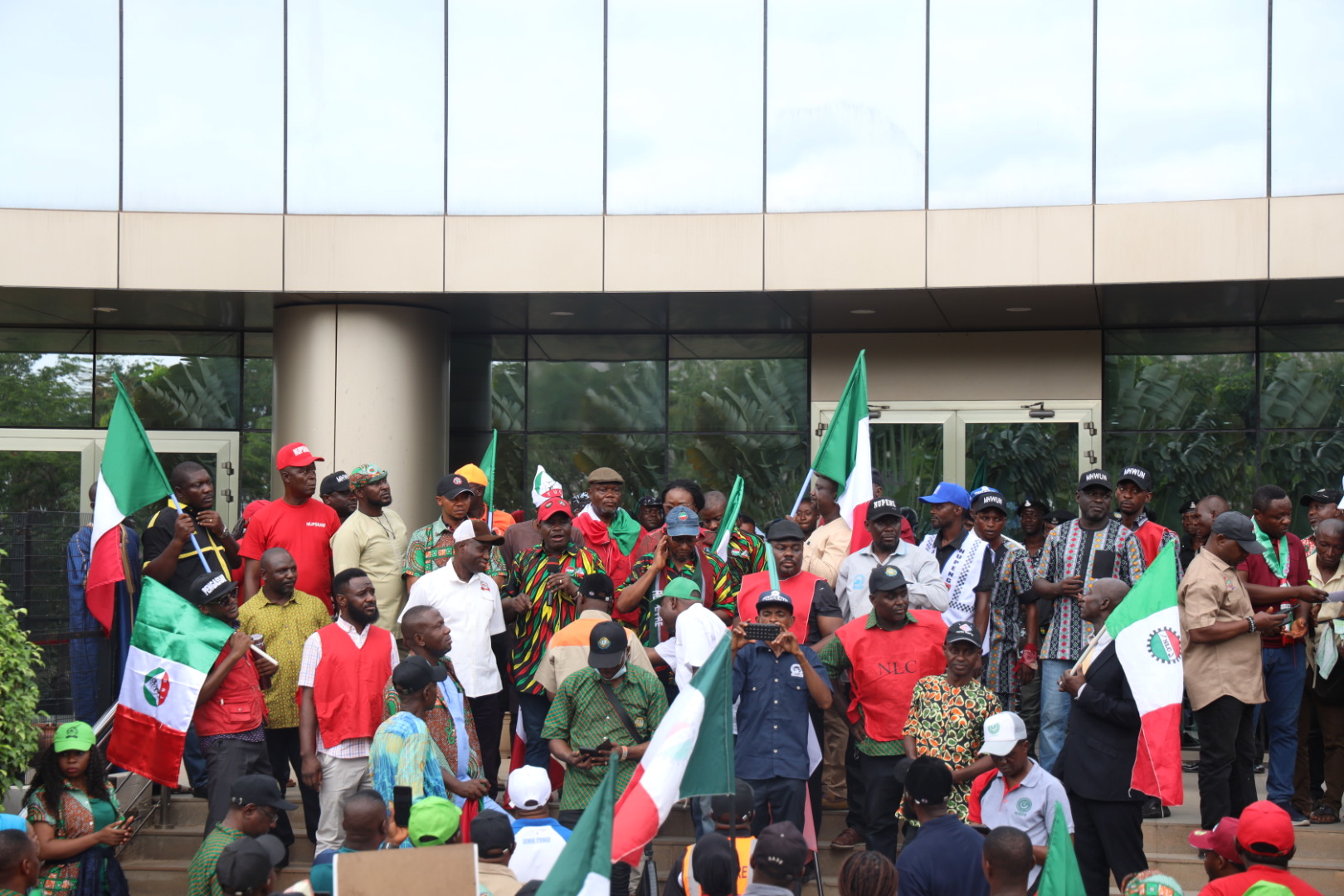
Ex-PDP BoT member, Idahosa rejoins APC
The former member of the Board of the Trustees, BoT, of the Peoples Democratic Party, PDP, and a former ally of Governor Godwin Obaseki, Charles Idahosa has rejoined the All Progressives Congress, APC.
Idahosa said he was rejoining the party he left with Obaseki about four years ago to ensure victory for the APC in the September 21 governorship election.
He made this statement at his residence where he was received by leaders of the party, led by the Secretary of the APC in Edo State, Lawrence Okah.
Idahosa revealed that his greatest regret while in PDP, was not allowing Obaseki to resign as Edo Governor when he opened up to him (Idahosa) in his Benin residence that he was tired of the troubles he was getting from the leadership of the party led by Comrade Adams Oshiomhole.
Interest rates would stay high until inflation is tamed - Cardoso
Olayemi Cardoso, governor of the Central Bank of Nigeria (CBN), has hinted interest rates would remain high until inflation rate subsides.
In a Financial Times report on Monday, Cardoso also said orthodox policies would be implemented to tame inflation.
In March, Nigeria’s inflation rate rose to 33.20 percent — from 31.70 percent in February.
Consequently, CBN’s monetary policy committee (MPC) raised the interest rate by 200 basis points in March to 24.75 percent.
Cardoso said there is “every indication” that MPC would “do whatever is necessary” to rein inflation.
“They will continue to do what has to be done to ensure that inflation comes down,” Cardoso said.
“Let’s face it: for a long period of time, the CBN did not embrace orthodox monetary policies.
“We want to go back to using an orthodox method, and it will take us to where we want to go.”
Cardoso said the apex bank had been “reoriented” to focus on “price and monetary stability”.
He said the official window of the foreign exchange (FX) market has been stabilised.
According to the governor, investors previously had a “tendency to head for the window” in response to currency fluctuations, however, there has been a “fundamental shift”.
“They’re getting more comfortable with the market,” Cardoso said.
The naira fell to its lowest level of N1,627.40/$ in the official FX window on March 8 but rallied to N1,154.08/$ on April 18 — after which the local currency began to lose its gains.
As of May 10, the official FX rate stood at N1,466.31/$.
Also, Cardoso maintained that raising interest rates has been crucial.
He hoped that high interest rates would not linger for too long and act as a disincentive to investment and production.
“Hiking interest rates obviously has had a dampening effect on the foreign exchange market, so that has begun to moderate. It’s not a zero-sum game. You lose on one side, you get on the other,” he said.
He said inflation was higher than he had hoped, blaming “distortions” mainly due to high food prices.
Cardoso said it is not directly within CBN’s control.
Food inflation rose to 40.01 percent in March, compared to the 24.45 percent rate recorded in the same month last year.







![[OPINION] Cybersecurity Levy: Matters Arising - Reuben Abati](/media/k2/items/cache/95ab44161514c695033355c3460424db_Generic.jpg?t=20240514_084345)


